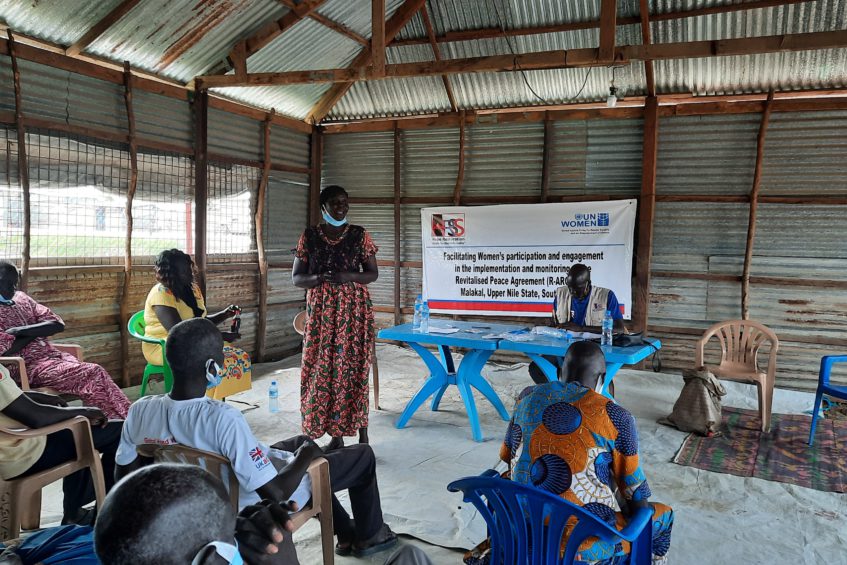
Women mediator network member leading a community dialogue on transitional processes, gender mainstreaming and women's meaningful participation in the implementation of the R-ARCSS in Malakal County, Upper Nile State - credit: HRSS Media
Some women in Upper Nile State have opted to be peace mediators and formed Women Peace Mediators’ Networks to help them participate in peace initiatives in Malakal and Ulang Counties.
According to the Hope Restoration Organization, the network which was formed in August 2021 has a total of 50 women, 25 for Malakal network and 25 for Ulang network.
The project is supported by UN Women, South Sudan.
The women have been involved in monthly community decision making meetings since last year and they represent women issues and negotiate women’s positions.
The women mediator network represents women’s issues in community decision making.
This creates an opportunity for women to be actively involved in peace building as active receivers.
In these women peace networks, women are trained in mediation, negotiation and conflict resolution skills that position them in a better platform to represent women issues at the decision making table.
Some women have decided to be part of the women peace mediator networks because they want a conducive environment where their children can go to school and do their business.
One member of women mediator networks in Ulang County, who is only identified as Elisabeth, says the conflict has killed her husband and she wants to see a lasting peace so that her daughter goes to school.
“It’s my hope to see that this peace lasts so that my daughter can go to school after I lost my husband in the conflict,” Elizabeth said. network.
Another member of women mediator networks in Malakal [Protection of Civilian site], who preferred to be identified as Nyamal for security reasons, says she wants to see a peaceful environment where she can do her business without problem.
“I want the peace to continue so that I can finally return to my ancestral land where I was operating my business,” Nyamal said.
The promise of a young nation – South Sudan, is one with limitless possibilities, hopes and dreams reminiscent of one’s childhood where everything exists as it should be: peacefully and full of promise.
In all this, peace is not just wanted, it is needed.
For this to happen, all the stakeholders; men and women, need to be brought on board so as to achieve not only peace initiatives but also ensure a society where equal opportunities are available for everyone.
When called upon, these women can also negotiate and resolve conflicts in the community.
Peace is not merely the absence of war or conflict, it is where everyone is at liberty to achieve full potential.
As South Sudan rises from the rife of conflict, peace is the road on which we hitch our wagon to prosperity.
The Revitalized Agreement for the Resolution of Conflict in South Sudan (R-ARCSS) 2017, is a guide to prosperity.
However, it is difficult to realize this prosperity without including women.
Women are the backbone of society. Often this is difficult to refute given the triple roles of women including peace building.
This does not just apply to the world over but in South Sudan as well. Women are necessary for peace building, peace keeping right from national to grassroots level.
Women are more than just singers and dancers for peace rallies and events.
Women are natural negotiators and mediators’ right from the family unit and beyond.
As it is, women lay as an untapped resource for ensuring that peace initiatives last.
South Sudanese women are often the biggest losers in times of conflicts where they have lost livelihoods, their lives, and subjected to conflict related sexual violence.
This increase in female headed households when male figures die in conflicts, obligated to conform to cultural practices that are potentially harmful to them.
All these clearly demonstrate the importance of women participation in peace building. Consolidating efforts women have made towards peace building no matter how minimal it is goes a long way in peace sustainability.
Who has ownership of the peace for it to last? Men? Women? Both?
South Sudanese women have worked towards increased women inclusion in leadership positions in line with the 35% affirmative action provision in the R-ARCSS.
This is a triumph for women in South Sudan where it is estimated that as a result of conflict, 40% of women and girls have been affected by physical and sexual violence.
Increased implementation of the 35% affirmative action provision for women is necessary not only to alleviate discrimination of women in South Sudan but also to ensure that their views are not missed out in peace building process.
Women from national to grassroot levels have employed several strategies in order to realize the successful implementation of the 35% appointments in R-ARCSS.
EDITOR NOTE: The production of this article was supported by Hope Restoration Organization. Hope Restoration is a National NGO, non-profit and a non-partisan organization registered under the non-governmental organization act 2016 of the Republic of South Sudan by the Relief and Rehabilitation Commission (RRC) working in Upper Nile, Unity, Jonglei and Central Equatoria state.
Support Eye Radio, the first independent radio broadcaster of news, information & entertainment in South Sudan.
Make a monthly or a one off contribution.
Copyright 2024. All rights reserved. Eye Radio is a product of Eye Media Limited.